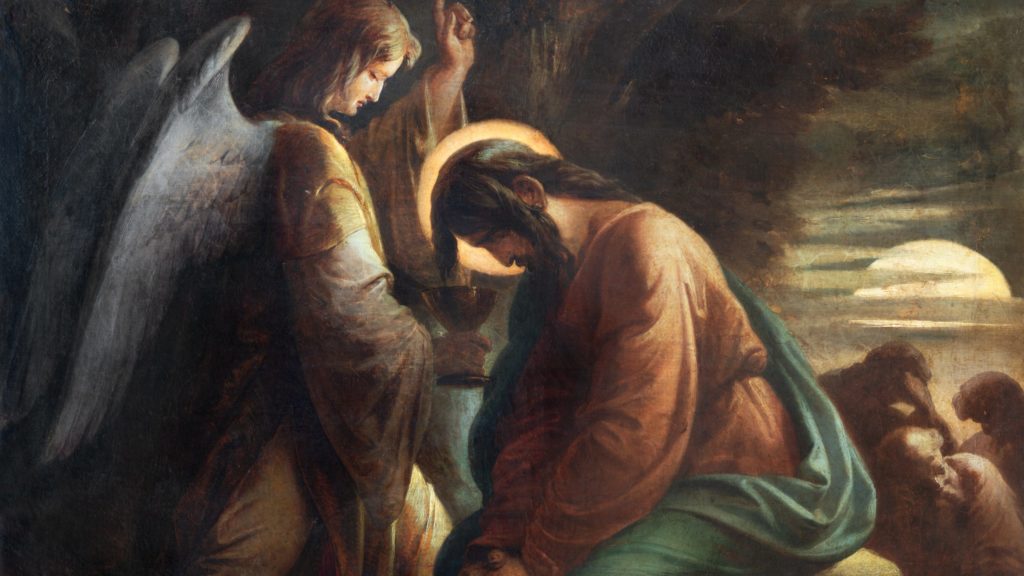Sometimes we make prayer more complicated than it should be. That great master of prayer, St. Francis de Sales, described prayer as a conversation or better, a dialogue.
In his “Introduction to the Devout Life” he writes: “It is good to use dialogue and talk to Our Lord and also to the Angels, to people who are represented in biblical mysteries, to the saints and even to ourselves, to our hearts, to sinners and even to insensible creatures, as we see in David and other saints in their meditations and prayers.”
A dialogue most appropriate for Lent would be to talk to the angel who comforted Jesus in his agony in Gethsemane.
This scene, which we remember in the first Sorrowful Mystery, is wholly scriptural, although we only find it in St. Luke’s Gospel. Jesus, we are told, knelt down and prayed,
“Father if thou art willing, remove this cup from me; nevertheless not my will but thine be done. And there appeared to him an angel from heaven, strengthening him. And being in an agony he prayed more earnestly and his sweat became like great drops of blood falling down upon the ground” (Luke 22:43–44).
The classical technique for meditating on such a Scripture is to put oneself in the scene as a spectator, to witness Jesus’ heartfelt prayer, to feel the pain of body and soul illustrated with his sweat made blood, and to see the angel with him.
De Sales’ words about colloquy encourage us to address not only the Lord in our dialogue, but also the “angel from heaven” sent to comfort the Savior. By our prayer, we become not just spectators of the scene, but interlocutors.
We find two prayers to this angel in the old Raccolta (“Collection”), a book containing prayers and pious devotions for which indulgences are attached.
One is very short, a cry of pain, which St. Pope Pius X recommended in a rescript in his own hand: “O holy Angel who strengthened Jesus Christ Our Lord, come and strengthen us.”
I know many people who, in their suffering, are in their own Gethsemane. This prayer helps one to identify with Jesus on the eve of his sacrifice and humbly ask for aid.
St. Luke says the angel “strengthened Jesus.” Angels are personal beings, so we can ask for the Lord’s help through the intercession of the spiritual being given that special mission to be with Jesus in his suffering humanity.
The second prayer to the angel of Gethsemane is longer and is more like a conversation with the angel. My version is in updated language:
“I greet you, holy Angel who comforted my Jesus in his agony, and with you I praise the most Holy Trinity for having chosen you from among all the holy angels to console and strengthen him who is the consolation and strength of all who are suffering.
“By that honor you received and the obedience, humility, and love with which you assisted the Sacred Humanity of Jesus, my Savior, as He fainted with sadness contemplating the sins of the world, and especially my sins, I beg you to pray that I may have perfect sorrow for my sins. Strengthen me in the afflictions that overwhelm me now and in all the other trials to come my way, especially in my own final agony.”
The second prayer implies a dialogue in which we celebrate with the angel his mission to Gethsemane. (Angels do not have gender, but possessive pronouns are necessary in English, hence “his”).
Asking for the angel’s help, the petitioner attempts to understand the angelic psychology, “by that honor which you received.” Our side of the conversation continues acknowledging the reason that Jesus was in agony: his apprehension of the weight of our sins that he was to carry.
St. John Henry Newman has a wonderful meditation on Jesus contemplating the ugliness of the sin of the whole world which he took on himself. That point of meditation makes us think that part of that ugliness was made by our personal sins.
The sins of the whole world included our own sins. We were there in the garden, represented by our sins which made Jesus sweat blood. Thus, we ask the angel to pray that we have a true repentance of our sins.
Then we pray to the angel for strength: What you did for the Sacred Humanity of Jesus, please do for us, by the grace of God.
In hospital rooms and funeral parlors, in nursing homes and hospice care, in the many lonely places of the human heart, the shadows of the olive trees in the moonlight of Gethsemane are present. The prayer to the angel who came to comfort Jesus, asking for consolation in imitation of Jesus, is a perfect example of the kind of colloquy de Sales recommended.
It was customary when the Raccolta was printed to assign a numerical value of “indulgenced” days to the prayers and devotions.
As Catholics, we believe an indulgence is a shortening of the “temporal punishment” that we deserve for our sins, a penalty that still must be paid, even though we have repented our sins and been forgiven in confession. It is about purification.
Assigning a value of days was a metaphor of justice and proportion. These two prayers were granted 300 days and 500 days indulgence, respectively, amounts which now the Church calls simply, a “partial” indulgence. It is the Church’s way of saying that all prayer is fruitful for purifying our souls and helping us to make up for our past sins.
Who would not be blessed (purified) by having a “moment” of conversation with an angel?

